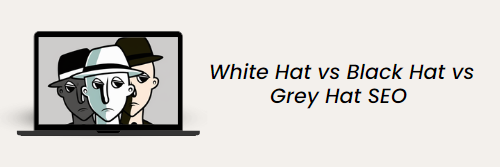Search engine optimization (SEO) is a constantly evolving field, and as search engines become more sophisticated, so do SEO tactics. There are three primary types of SEO: white hat, black hat, and grey hat. In this post, we’ll explore the differences between them and why it’s important to use ethical SEO practices.
White Hat SEO
- White hat SEO refers to ethical and legitimate SEO techniques that comply with search engine guidelines.
- Examples of white hat SEO include keyword research, optimizing meta tags and content, building quality backlinks, and creating a user-friendly website.
- White hat SEO takes time and effort, but it’s a sustainable approach that can lead to long-term success and higher rankings in search results.
- Examples of white hat techniques include guest blogging, creating high-quality content, and using ethical link-building strategies.
Black Hat SEO
- Black hat SEO is a technique that violates search engine guidelines and tries to manipulate search rankings through spammy, unethical, or illegal tactics.
- Examples of black hat SEO include keyword stuffing, cloaking, hidden text, link farms, and buying links.
- Black hat SEO can lead to immediate results, but it’s a risky approach that can result in severe penalties from search engines, including de-indexing or banning your website.
- Examples of black hat techniques include hacking websites, creating doorway pages, and using private blog networks (PBNs).
Grey Hat SEO
- Grey hat SEO refers to neither ethical nor unethical techniques but falls somewhere in between.
- Examples of grey hat SEO include using reciprocal linking, duplicating content, and purchasing expired domains.
- Grey hat SEO can provide some benefits, but it’s a risky approach that can lead to penalties from search engines.
Why Use Ethical SEO Practices?
Ethical SEO practices provide a more sustainable approach to SEO, ensuring that your website ranks well in the long term.
Ethical SEO also provides a better user experience, which can lead to increased traffic, engagement, and conversions.
Using black hat or grey hat techniques can result in penalties from search engines, severely impacting your website’s visibility and traffic.
In extreme cases, black hat SEO practices can lead to legal consequences, including fines and lawsuits.
Conclusion
Ethical SEO practices are the best way to ensure long-term success for your website. White hat SEO techniques may take more time and effort, but they provide a sustainable and safe approach to SEO. Black and grey hat SEO may provide immediate benefits but have significant risks and can harm your website’s reputation and rankings.
Remember, SEO is an ongoing process that takes time, effort, and commitment to achieve long-term success. If you’re interested in learning more about ethical SEO practices and how to optimize your website for better visibility and traffic, check out our SEO 101 course. Sign up today and take your SEO game to the next level!


